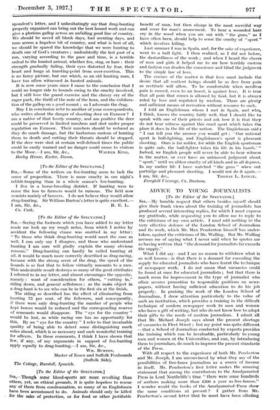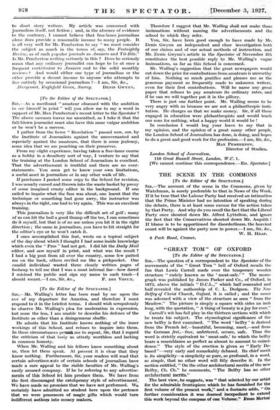ADVICE TO YOUNG JOURNALISTS
[To the Editor of the SPECTATOR.] SIR,—My humble request that others besides myself should give their frank views about the training of journalists has produced several interesting replies, for which I must express my gratitude, while requesting you to allow me to reply to the criticisms of my own article. I need add nothing to the very effective defence of the London School of Journalism and its work, which Mr. Max Pemberton himself has under- taken, against the criticisms of Mr. Walling. But Mr. Walling accuses me of saying what I never said when he quotes me as having written that "the demand for journalists far exceeds the supply."
What I did say—and I see no reason to withdraw what is so well known—is that there is a demand far exceeding the supply for educated journalists who have learnt the technique of newspaper work. I do not mean that vacancies could be found at once for educated journalists ; but that there is much room for improvement in the type of journalist who often secures promotion to responsible positions on news- papers, without having sufficient education to do his job properly. In praising the work of the London School of Journalism, I drew attention particularly to the value of such an institution, which provides a training in the difficult technique of modern newspaper work to men and women who have a gift of writing, but who do not know how to adapt their gifts to the needs of modern journalism. I admit all that Mr. Michael Joseph says about the present shortage of vacancies in Fleet Street ; but my point was quite different —that a School of Journalism conducted by experts provides the training which can be invaluable, particularly to young men and women at the Universities, and can, by introducing them to journalism, do much to improve the present standards of the Press.
With all respect to the experience of both Mr. Pemberton and Mr. Joseph, I am unconvinced by what they say of the possibilities of free-lance journalism as a source of income in itself. Mr. Pemberton's first letter makes the amazing statement that among the contributors to the Amalgamated
Press in Lord Northcliffe's time " there were some hundreds of authors making more than £500 a year as free-lances." I wonder would the books of the Amalgamated- Press show the same conditions at present ? I gather from Mr. Pemberton's second letter that he must have been alluding to short story writers. My article was concerned with journalism itself, not fiction ; and, in the absence of evidence to the contrary, I cannot believe that free-lance journalism alone does provide a reasonable income to many people. It is all very well for Mr. Pemberton to say " we must consider the subject as much in the terms of, say, the Fortnightly Review, as of such popular journals as Answers and Tit-Bits." Is Mr. Pemberton writing seriously in this ? Does he seriously mean that any ordinary journalist can hope to be at once a frequent contributor to Answers and to the solid monthly reviews ? And would either one type of journalism or the other provide a decent income to anyone who attempts to live entirely by occasional journalism ?—I am, Sir, &c., Marycourt, Englefield Green, Surrey. DF.NIS GWYNN.











































































 Previous page
Previous page